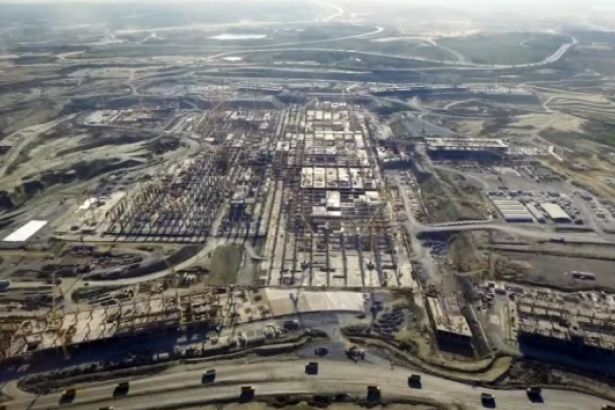Decision for İstanbul's third airport: No need for environmental impact assessment

Turkey’s Ministry of Environment and Urbanization has decided that an environmental impact analysis is not needed for the third airport project in Istanbul despite the initial information file of the project mentioned about possible harm to marine animals.
The construction project of the third airport in Istanbul, which is located in Tayakadın, Arnavutköy on the Black Sea coast and to give fuel supply service for airplanes, has now been brought to an end.
The construction of the airport started after the positive report regarding the 'Environmental Impact Assessment (EIA)' on March 9, 2017. However, the project was changed due to the problems on the surface. After 'İstanbul New Airport Fuel Supply Additional Reclamation Ground' project was prepared again and presented to the Ministry, EIA period restarted on January 2, 2018. After 27 days, on January 29, 2018, the Ministry of Environment and Urbanization announced that an environmental impact assessment is not needed for this project.
LOSS OF BIOMASS EXPECTED
The reclamation ground project, for which Turkish Ministry decided no assessment is needed, had significant warnings in information file.
As stated in the information file of the project, the first living organisms to be affected in the reclamation ground are the benthic, organisms living in the sediment surface and some sub-surface layers. 'There might be a loss of biomass in macrobenthos on the reclamation ground. Marine bottom habitat being sandy, benthic diversity here consists of species that have adapted to these areas. Structure of habitat being monotype makes a restrictive effect on biodiversity', it was added.
FISHES TO SUFFER FROM DYSPNOEA
Regarding the probable negative effects of constructing the reclamation ground, seawall and pier on marine flora and fauna are emphasized.
These processes are said to cause marine fauna to leave the area temporarily and it is reported that 'the blurring during the reclamation reducing the conductivity of light will cause an unsolicited status for the development of phytoplanktonic organisms, which are monocellular organisms underlying the marine food chain. Although dyspnoea is expected due to blurriness, this is not going to affect the overall populations and can be negligible.'
TUBITAK REPORTS NO HAZARD
The file includes TUBITAK (the Scientific and Technological Research Council of Turkey) Marmara Research Centre (MAM) Environment and Clean Production Institute’s analyses of hazardous waste in 12 bottom samples. No toxic effect was detected in ‘Ecological Toxicity Test’ in the analyses. Acute Toxicity Test for marine organisms applied on fish resulted nonhazardous.
87 THOUSAND CUBIC METERS OF RECLAMATION GROUND
Within the project, west seawall of the port was dislocated to 35 meters north as a caution for stability problems due to the poor bearing soil.
East seawall which was 550 meters reconstructed to be 100 meters longer. 87 thousand 757 cubic meters of reclamation is planned for the port. This reclamation will consist an area of 15 thousand square meters. Reclamation will be completed in about 6 months. The investment cost of the project is calculated as 8 million 500 thousand TL (app. 2 million 265 thousand USD).



